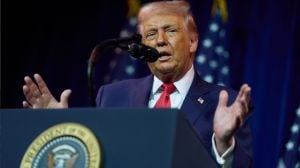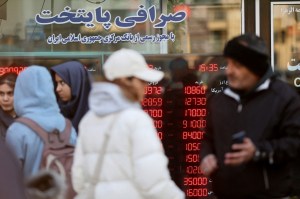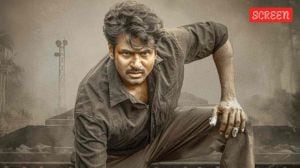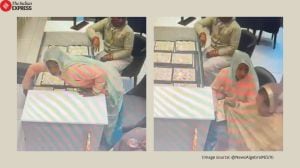Just a little statesmanship
Justice G.T. Nanavati has not reacted well to the finding that the fire in the railway compartment near Godhra was 8216;8216;accidental1...

Justice G.T. Nanavati has not reacted well to the finding that the fire in the railway compartment near Godhra was 8216;8216;accidental8217;8217;. He wonders what will happen if the commission he and Justice Shah constituted to look into the Gujarat riots comes to a different conclusion from the one that Justice U.C. Banerjee has reached. A parallel inquiry, Nanavati says, should never be ordered because it can create confusion and defeat the purpose for which the inquiry commission is appointed. He looked disturbed when I met him at his residence in New Delhi after he had submitted the 1984 anti-Sikh riots report to the home minister.
Nanawati sees no difference between the pattern in which the rioting, killing and looting was organised in Delhi and Gujarat. 8216;8216;In the first, the Sikhs were the victims and in the second the Muslims,8217;8217; he says. In both places, he finds plenty of evidence to support the conclusion that some politicians instigated the events and that the authorities, particularly the police, looked the other way when the crimes were being committed.
Shaken by the instances of planned and deliberate rioting, Nanavati throws up his hands in despair. Anything can happen anywhere at any time in the country, he says, because politicians follow no value system and the police observe no limits on their behaviour and actions. His condemnation of politicians is, indeed, scathing. 8216;8216;I have not tried to whitewash anything,8217;8217; says Nanawati. 8216;8216;Some in the media were unfair to me because what they had used from the 1984 report was partly concocted and partly torn out of context.8217;8217; Nanawati does not talk on Gujarat beyond generalities. He is still in the process of probing. But he does not hide his disappointment.
I was not surprised to read, subsequently, an interview by former president K.R. Narayanan that despite his repeated advice to take strong action and timely measures to quell the violence in Gujarat, the state government as well as the Union government failed to do so. Narayanan said: 8216;8216;He Vajpayee did not do anything effective. I had sent him letters. I had talked to him directly8217;8217;. I have all the respect for Narayanan. But in such situations, mere advice does not help. He should have threatened to resign when faced with the government8217;s lack of response. His act would have made the entire nation, including the government at the Centre, sit up. The Modi government was the BJP8217;s creation. It could not have defied Vajpayee, the topmost leader in the party high command. Narayanan let the government off the hook. His disclosure now is at best a startling revelation, but actually only a revelation.
We often tend to compromise on the deepest commitments when we come across situations that could create complications. I recall Vajpayee himself fretting, fuming and promising to do something after he visited Gujarat. What happened to him afterwards, particularly in Goa where he even attacked Islam, is no more a secret. He just collapsed in the face of resistance. Which Vajpayee emerges at what time is an embarrassment both to his friends and foes. I did not believe the Outlook story of Vajpayee8217;s complicity in the demolition of the Babri masjid till I saw the video clip. He was unequivocal in his warning 8212; one day before the destruction 8212; that something would happen on the next day.
More skeletons are tumbling out of the Gujarat cupboard. Lies cannot hide the truth for long. That Modi had ordered the tapping of telephone calls of his home minister before he was bumped off was on expected lines. In fact, Modi8217;s hand was visible everywhere, from the planning to execution. There is a case for a separate commission to inquire his complicity alone. In fact, I wrote a letter to Home Minister Shivraj Patil to appoint a commission on Modi. But Patil did not accede to my request. One day, I am sure, Modi will face a Nuremberg-like trial.
Coming back to Nanavati8217;s observation on the anti-Sikhs riots, he has no doubt that the community was specially targeted for attack and that the authorities connived in the incidents of murder, rape and loot. He has mentioned some names in the report, including that of a sitting MP of the Congress party. What happens to him? 8216;8216;It was up to Parliament to decide,8217;8217; says Nanavati. The rioting, according to him, began around the capital8217;s All India Institute of Medical Sciences where the body of the assassinated Indira Gandhi lay. Subsequently, the motorcade of the then President Zail Singh, who had gone to enquire about Mrs Gandhi, was stoned. 8216;8216;The fury lasted for one day,8217;8217; Nanavati believes. The general impression, however, is that the rioting continued for three days.
The army was late to arrive, concedes Nanavati. It did not have enough vehicles. Also, the force was not familiar with the different localities. However, he does not comment on the allegation that the government had purposely delayed the army8217;s induction. He is particularly harsh on the prosecuting agency. He proposes something like the National Prosecuting Agency so that the prosecution does not succumb to political pulls and pressures.
Nanavati believes that although many of the things the government did were reprehensible yet it is also true that orders from above were generally not obeyed. 8216;8216;I have seen the instructions issued by the top but they were not implemented.8217;8217; This is, indeed, a serious charge that suggests the protectors of law had become the mob without caring for their superiors8217; orders. Connivance is bad enough but participation is something horrendous to contemplate in a democratic society.
The 1984 report, I am afraid, may not satisfy the Sikh community which has been undoubtedly wronged. But then even the most critical report cannot heal the wounds. Truth is, the government owes an explanation to the Sikhs and, more so, to the country. Let Prime Minister Manmohan Singh say in Parliament that whatever the limitations in the Nanavati report, the government seeks forgiveness from the nation and the victimised community. It may not serve the purpose of politics but it will be statesmanship.
- 01
- 02
- 03
- 04
- 05































